
The Mindbenders were an English beat group from Manchester. Originally the backing group for Wayne Fontana, they were one of several acts that were successful in the mid-1960s British Invasion of the US charts, achieving major chart hits with "The Game of Love" in 1965 and "A Groovy Kind of Love" in 1966.

Carole Bayer Sager is an American lyricist, singer, songwriter, and painter.
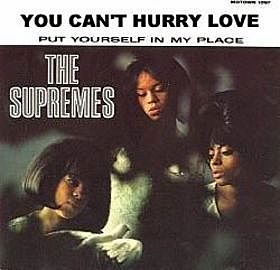
"You Can't Hurry Love" is a 1966 song originally recorded by the Supremes on the Motown label. It was released on July 25 of 1966 as the second single from their studio album The Supremes A' Go-Go (1966).

Toni Wine is an American pop music songwriter, who wrote songs for such artists as The Mindbenders, Tony Orlando and Dawn ("Candida"), and Checkmates, Ltd. in the late 1960s and 1970s. Wine also sang the female vocals for the cartoon music group The Archies, most notably on their #1 hit song "Sugar, Sugar". She shared the lead vocals in the Archies' subsequent single, "Jingle Jangle" with Ron Dante using his falsetto voice. In addition, Wine was a backing vocalist on "It Hurts to Be in Love" and on Willie Nelson's "Always on My Mind."
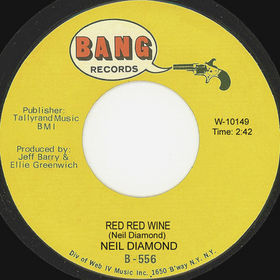
"Red Red Wine" is a song originally written, performed and recorded by American singer Neil Diamond in 1967 that appears on his second studio album, Just for You. The lyrics are written from the perspective of a person who finds that drinking red wine is the only way to forget his woes.
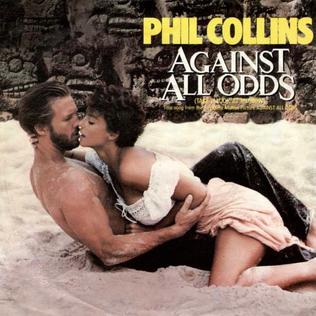
"Against All Odds (Take a Look at Me Now)" (also titled "Against All Odds") is a song by English drummer, singer and songwriter Phil Collins. It was recorded for the soundtrack to the 1984 film of the same name. It is a power ballad in which its protagonist implores an ex-lover to "take a look at me now", knowing that reconciliation is "against all odds", but worth the gamble. The single reached No. 1 on the Billboard Hot 100 in the United States, the first of seven US No. 1's for Collins in his solo career. "Against All Odds (Take a Look At Me Now)" also topped the charts in Canada, Ireland, and Norway, while peaking at No. 2 in the United Kingdom.
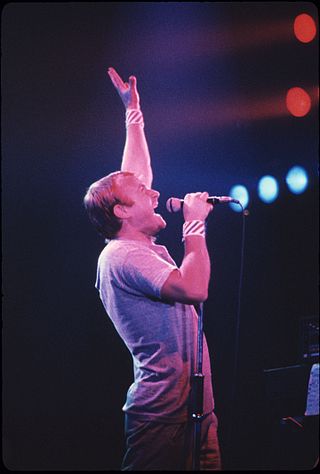
English musician Phil Collins has released 8 studio albums, 1 live album, 5 compilation albums, 2 remix albums, 3 soundtrack albums, 2 box sets, 50 singles, 18 video albums, and 41 music videos. A Grammy and Academy Award-winning solo artist, Collins has sold more than 34.5 million albums in the United States, and 150 million records worldwide.
Groovy is a slang colloquialism popular during the 1950s, '60s and '70s. It is roughly synonymous with words such as "excellent", "fashionable", or "amazing", depending on context.
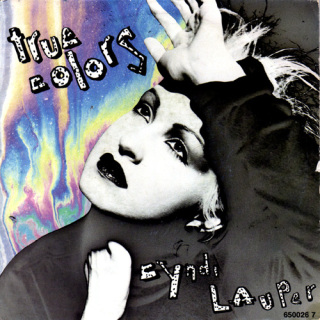
"True Colors" is a song written by American songwriters Billy Steinberg and Tom Kelly. It was both the title track and the first single released from American singer Cyndi Lauper's second studio album of the same name (1986). Released in mid-1986, the song would become a hit for Lauper, spending two weeks at number one on the US Billboard Hot 100, becoming her last single to occupy the top of the chart. It received a Grammy Award nomination for Best Female Pop Vocal Performance.

"Easy Lover" is a song performed by Philip Bailey of the band Earth, Wind & Fire and Phil Collins of the band Genesis, jointly written and composed by Bailey, Collins, and Nathan East. The song appears on Bailey's solo album, Chinese Wall. Collins has performed the song in his live concerts, and it appears on both his 1990 album, Serious Hits... Live!, and his 1998 compilation album, ...Hits. It is Bailey's only US Top 40 hit as a solo artist.

"Two Hearts" is a song by Phil Collins from the soundtrack to the film Buster (1988), in which Collins played the lead role. The song was written and produced by Collins and Lamont Dozier. It reached number one in the United States and Canada in January 1989. It features in the end credits.

Glyn Geoffrey Ellis, known professionally as Wayne Fontana, was an English rock and pop singer best known for fronting the beat group the Mindbenders, with whom he recorded the hit singles "Um, Um, Um, Um, Um, Um" (1964) and "The Game of Love" (1965). After leaving the Mindbenders to pursue a solo career, Fontana had further UK successes including "Pamela Pamela" (1966). Despite legal issues in the 2000s, he continued to perform on the 60s nostalgia circuit until his death.

Buster: The Original Motion Picture Soundtrack is the soundtrack for the 1988 British film Buster. The album was released on September 19, 1988. It is essentially a collection of oldies, tucked in between two Phil Collins songs that were recorded for the film, in which he starred. "Two Hearts" was specially written for the film, having earned a Grammy Award for Best Song Written Specifically for a Motion Picture or Television in 1989, a Golden Globe Award for Best Original Song as well as an Academy Award nomination for Best Original Song, and "A Groovy Kind of Love" with a Grammy Award nomination for Best Pop Vocal Performance, Male was a remake of a song taken to #2 in the UK Singles Chart in 1965 by The Mindbenders. Both were released as singles, and topped the Billboard Hot 100 chart, with "A Groovy Kind of Love" also reaching #1 in the UK. Other new songs include Collins' "Big Noise" and Four Tops' "Loco in Acapulco", co-written by Collins. At the Brit Awards in 1989 it won for Soundtrack/Cast Recording, while Collins received the award British Male Artist for his contribution to the soundtrack album.

"The Game of Love" is a 1965 song by Wayne Fontana and the Mindbenders, released in the United States as "Game of Love".
Clinton Conger Ballard Jr. was an American songwriter, singer, and pianist. He wrote two Billboard Hot 100 number one hits. The first was "Game of Love" by Wayne Fontana and The Mindbenders in 1965. The second was the 1975 hit, "You're No Good" by Linda Ronstadt. He wrote two UK number one singles, recorded by Jimmy Jones and The Hollies.

"Um, Um, Um, Um, Um, Um" is a song, written by Curtis Mayfield.
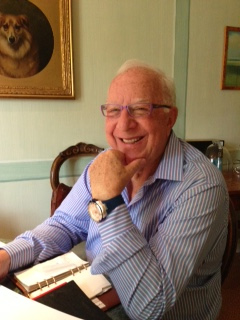
Harvey Brian Lisberg is an English talent manager and impresario, best known for discovering Herman's Hermits in 1963. In 1965, he signed songwriter Graham Gouldman, a founder member of 10cc, who Lisberg also managed, along with Godley & Creme, Tony Christie, Barclay James Harvest, Gordon Giltrap, Sad Café, Wax and others.
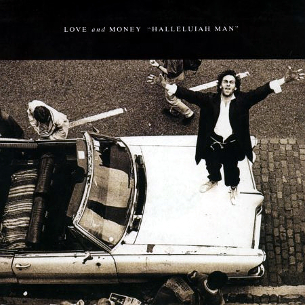
"Halleluiah Man" is a song by Scottish band Love and Money, which was released in 1988 as the lead single from their second studio album Strange Kind of Love. The song was written by James Grant and produced by Gary Katz. "Halleluiah Man" reached No. 63 in the UK Singles Chart and No. 75 on the US Billboard Hot 100.

"She Needs Love" is a song written by Clint Ballard Jr. for Wayne Fontana and the Mindbenders. It was the third and final song written by him that the group recorded, following "The Game of Love" and "It's Just a Little Bit Too Late". Upon release, the single only reached number 32 in the UK, which prompted Fontana to pursue a solo career while the Mindbenders continued as a trio.
"It's Just a Little Bit Too Late" is a song written by Clint Ballard Jr. and Les Ledo, which was originally recorded by Clyde McPhatter in 1963. A British beat group named the Druids would release their version in 1964 before the definitive version by Wayne Fontana and the Mindbenders was recorded and released as a single in 1965. Their version was the second of three songs by Clint Ballard Jr. that the group recorded together with "The Game of Love" and "She Needs Love". Their rendition of the song reached number 20 in the UK's Record Retailer but failed to emulate the success of their previous single "The Game of Love", only reaching number 45 on the Billboard Hot 100.


















